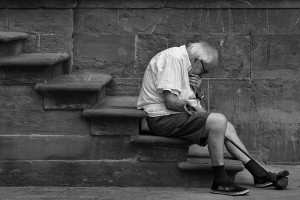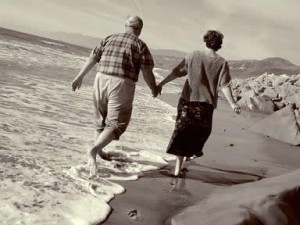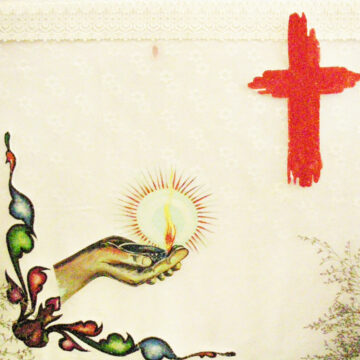 It is difficult to define old age: it is a very complex phenomenon in whose ‘construction’ biological, genetic, physical, psychological and pathological elements are at work, as well as cultural, social and environmental ones. And then it is a very personalised phenomenon that does allow of very many generalisations. The way in which a person ages is very much influenced by ‘images’ of old age. (25) The old Latin adage that ‘senectus ipsa morbus est’ (‘old age is an illness’) is arbitrary and without real scientific foundations. It can also be contradicted by the fact that today people increasingly age in good health. That an elderly person is more likely to fall sick and experience the specific illnesses of old age is a given fact, but that old age and illness are equivalent, like old age and dependence, is not in the least to be taken for granted. And yet as never before old age is medicalised, and this is the way by which people deny that old age is an event of life and affirm that in old age there is only a body to be treated. This is a socially constructed image of old age which greatly influences our way of thinking about it. Given that an elderly person loses the social roles that defined him or her, he or she often has to experience old age as a role. It is as though society no longer recognises individuals as managers, housewives or workers but has homogenised them into the social category of the elderly, where they are at times grouped together in those ‘car parks for the elderly’ where the phrase ‘life expectancy’ has something about it that is incongruous, not to say obscene.
It is difficult to define old age: it is a very complex phenomenon in whose ‘construction’ biological, genetic, physical, psychological and pathological elements are at work, as well as cultural, social and environmental ones. And then it is a very personalised phenomenon that does allow of very many generalisations. The way in which a person ages is very much influenced by ‘images’ of old age. (25) The old Latin adage that ‘senectus ipsa morbus est’ (‘old age is an illness’) is arbitrary and without real scientific foundations. It can also be contradicted by the fact that today people increasingly age in good health. That an elderly person is more likely to fall sick and experience the specific illnesses of old age is a given fact, but that old age and illness are equivalent, like old age and dependence, is not in the least to be taken for granted. And yet as never before old age is medicalised, and this is the way by which people deny that old age is an event of life and affirm that in old age there is only a body to be treated. This is a socially constructed image of old age which greatly influences our way of thinking about it. Given that an elderly person loses the social roles that defined him or her, he or she often has to experience old age as a role. It is as though society no longer recognises individuals as managers, housewives or workers but has homogenised them into the social category of the elderly, where they are at times grouped together in those ‘car parks for the elderly’ where the phrase ‘life expectancy’ has something about it that is incongruous, not to say obscene.
The link between old age and death, the fact that old age is seen as that period between the end of normal life activities (retirement, the end of the reproductive capacity of a woman) and death, makes old age a kind of antechamber to death. Old age speaks to us of death and this makes it fearful and leads to an attempt to remove it. The elderly are seen as a burden and as being useless. Perhaps it is no accident that many elderly people give themselves over to death or escape into senile dementia. The death of the spirit allows death itself not to be noticed by the spirit. Today old age does not seem to be able to be written within any process of cultural symbolisation. In a cultural context that does not know how to love old age, the elderly, as well, are induced not to love themselves – they die socially before dying physically. A society that is organised around a fight against time, which inculcates the illusion of remaining always young, which removes death, can only reject old age as well. And the more death is felt to be unacceptable, the more elderly people, who represent it closer to hand, become the objects of true marginalisation. Here is located the problem of living old age as a spiritual adventure, of making old age an act. One is dealing above all else with understanding old age as an age of life, with its own prerogatives and opportunities.
Old age is life: learning to grow old is learning to live. (26) Jung emphasised that old age is a propitious time for internalisation and the theologian Karl Barth wrote that this stage of life offers man the possibility of living for grace, not duty. During old age, simply one is. In this, old age is an age of truth: we are not defined by what we do but by what we are. In addition, man is fully man in old age as well: habituated to reading old age in terms of less things and the end, we forget that an old man is a man who has lived more than other men, and, whatever the case, it is specifically in the weakness of old age that the imperative to steward and take care of the human that is inside us and others, that hosts us and other people, becomes stronger. And it hosts us during all the stages of life. It is the human inside us and inside other people of which we are not the masters – we are its guests. Exaggerated treatment and euthanasia run the risk of our forgetting this absolutely fundamental truth.
Spiritual tasks connected, that is to say, with the meaning of life and the humanisation of existence, are many during old age: facing crises and changes, reshaping the equilibriums of life as a couple with the reorganisation of domestic areas and tasks (after retirement and the move from work to other activities); facing up to and working through mourning and loss (both of loved ones and of possibilities and the ability to perform well); facing up to the decreases and weakness connected with the illnesses that may arise; and dealing with fears and terrors: fear of one’s own annihilation, of pain, of dependence, of loss of independence, of the loss of control over one’s own life, of the power of medical doctors, of being abandoned, of loneliness, of being a burden on one’s own loved ones…And yet old age can be an age that is freer than other ones and it can allow – always, obviously, in relation to the personal conditions of person’s own health – a creative reorganisation of one’s own time and spaces, of activities (trips, social engagements, reading and study…). One has to dare to have projects and provide oneself with goals to be achieved, and discover that weakness, frugality, slowness, can be values…
Old age is a gift that not everyone experiences (Jesus did not experience it). A positive conception of old age as a gift leads  to it being understood as an ‘opportunity’, as a task, and helps in a person’s ability to adapt to situations of diminution and loss. Mourning allows the filling in of an intolerable absence with a deepened interior presence. The spiritual task of old age lies in an exploration of oneself and in a parallel openness to the external, to the world and to other people. One has to accept in a serene way temporality, mortality and responsibility for one’s past life: this is a time of anamnesis, of memory. Old age is also a time of integration, of thinking anew about one’s own life so as to keep it united and welcome it once again. In feeling that the account of my life is listened to by other people, I also feel authorised to welcome my life and integrate my past by achieving peace with it. We know that narrating something can help the healing of interior wounds and memories. Psalm 7:1, which is the prayer of an elderly person, very well demonstrates all of these dimensions.
to it being understood as an ‘opportunity’, as a task, and helps in a person’s ability to adapt to situations of diminution and loss. Mourning allows the filling in of an intolerable absence with a deepened interior presence. The spiritual task of old age lies in an exploration of oneself and in a parallel openness to the external, to the world and to other people. One has to accept in a serene way temporality, mortality and responsibility for one’s past life: this is a time of anamnesis, of memory. Old age is also a time of integration, of thinking anew about one’s own life so as to keep it united and welcome it once again. In feeling that the account of my life is listened to by other people, I also feel authorised to welcome my life and integrate my past by achieving peace with it. We know that narrating something can help the healing of interior wounds and memories. Psalm 7:1, which is the prayer of an elderly person, very well demonstrates all of these dimensions.
And prayer is the last element that can help the spiritual work required by old age as regards the taking on and integration of one’s life before God. One can then discover how old age, as well, can be ‘fertile’ (Psalm 92:15) and ‘rich in mercy’ (Psalm 92:11, vulg.). A time of looking at the essential, old age thus shows that it is rich in experience of the mercy of God which becomes tenderness and particularly careful attention towards other people. This was present in the elderly Simeon and Anna who welcomed to their arms the child Jesus, the mercy of God made flesh, and opened up times of salvation (27). Old age, more than an end is then a completion. (28)














Camillians on Facebook
Camillians on Twitter
Camillians on Instagram